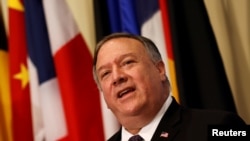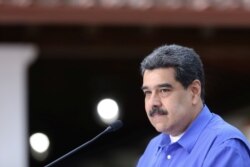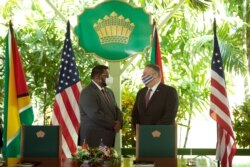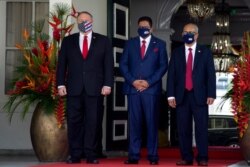U.S. Secretary of State Mike Pompeo traveled Friday to Brazil where he visited a Venezuelan refugee processing center, while calling for democracy and for Venezuelan President Nicolas Maduro to step down.
About 250,000 Venezuelan refugees are now in Brazil, with about 600 arriving daily before the border was closed because of the coronavirus. Pompeo visited the center alongside Brazilian Foreign Minister Ernesto Araújo.
During a joint press conference with Araújo, Pompeo said Venezuelan refugees "want what all human beings want — dignity, they want a democratic, peaceful, sovereign Venezuela to call home, one where they and their children can find jobs and live with that dignity. We — the United States and Brazil — support them."
He said while nobody can predict the day when Maduro will leave office, "the day will come."
Pompeo also announced the United States will give $348 million to help Venezuelan refugees, including $30 million for those in Brazil.
Araújo told reporters his country is "coordinating with the United States so we can give better lives to the Venezuelan people."
Pompeo is visiting four South American nations, three of which share a border with Venezuela.
In Guyana and Suriname
Earlier Friday, Pompeo was in Guyana where he met with President Irfaan Ali to discuss growing economic ties between their countries, as well as the situation in Venezuela.
"We know that the Maduro regime has decimated the people of Venezuela and that Maduro himself is an indicted narcotics trafficker. That means he has to leave," Pompeo said, referring to U.S. drug trafficking charges against Maduro.
During the brief visit to Guyana, Pompeo and Ali signed agreements for cooperation on energy and infrastructure.
Gyuana and Suriname, which Pompeo also visited this week, have in recent years discovered large oil reserves.
In 2015, Exxon announced it had discovered a large oil reserve off the coast of Guyana. The finding gives Guyana, which is South America's second-poorest nation, the potential to become one of Latin America's largest producers of oil. Exxon is already working in Suriname.
During their appearance Friday, Ali and Pompeo both said they had not discussed Exxon's deal with Guyana.
"We did not discuss this. But I want to say that we are open to investment," Ali said. "We are open to investors. … As we have said, prior to the elections, there are issues that we'll have to review."
Pompeo said the negotiations were between Exxon and the Guyanese government, something he called "the American model."
China has been courting both Guyana and Suriname as they seek foreign investment.
Pompeo is next traveling to Colombia, the last stop on his four-nation tour of South America.








